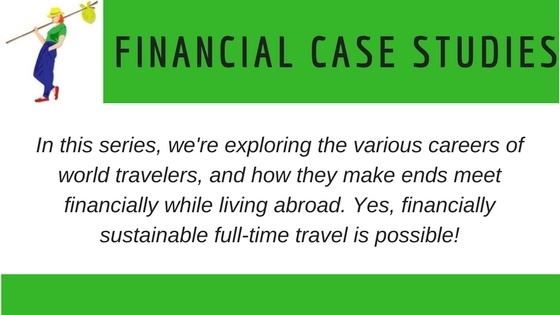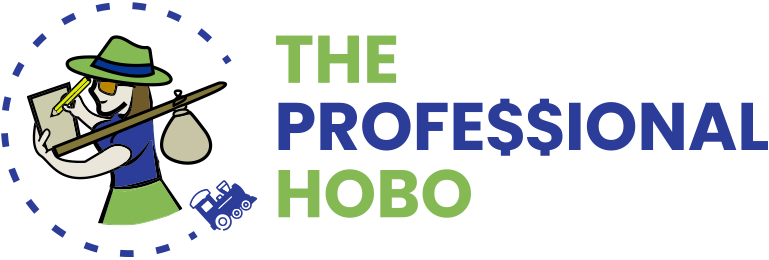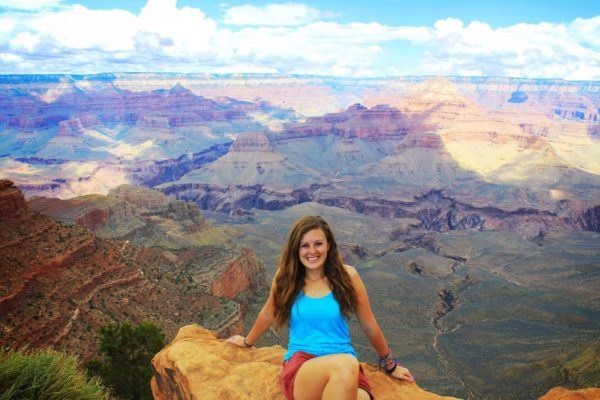Lauren Juliff was born in London, England, and has spent the past six years travelling the world and venturing outside of her minuscule comfort zone. Once afraid of buses, eggs, small talk, rice, and most anything you can think of, through travel she has overcome anxieties large and small in a quest to prove to a former Lauren she can do anything she sets her mind to. Lauren runs the travel blog Never Ending Footsteps, where she writes about her frequent misadventures, and is the author of the travel memoir How Not to Travel the World (which I’ve read and really enjoyed!). She does quite well with her travel blog, as well as her book and some freelance writing – and she only works half the year. Learn more about Lauren’s (lucrative) work-life balance lifestyle here!

This post was originally published in 2017. It has since been updated for accuracy of links and content.
How long have you been living/working on the road, and where have you traveled to?
I’ve now been traveling and working online for six years, which blows my mind, as I originally planned to be gone for just one! I spent the first five of those years travelling full-time, then moved to Lisbon, Portugal, where I currently base myself for six months of the year. Portugal hasn’t quite worked out for me, though, so I’m going to be leaving at the end of the year in search of a new home to return to between trips.
I’ve visited 75 countries across five continents in total, so far focusing mainly on North America, Europe, Southeast Asia, and Oceania. This year, my aim was to check out as many African countries as I could. Next year, I’ll be focusing on Latin America.
Please describe what you do for income.
It’s evolved over the years and I expect it to change in the future, too.
First and foremost, I’m a travel blogger and earn the vast majority of my income through this. Specifically, I make money through display advertising, affiliate sales, and sign-ups for my travel anxiety course.
Secondly, I was unbelievably fortunate to gain a publishing deal through my blog and I now earn royalties as an author from sales of How Not to Travel the World.
Finally, I work as a freelance writer and editor, specializing in travel. My main work comes through a regular gig with Trip Savvy, but I occasionally write for various travel magazines and websites on a one-off basis. I have to confess that I really don’t enjoy freelance writing, so I say no to almost anything that comes my way these days.
After dabbling with sponsorships when I first started blogging, I quickly realized it wasn’t a route I was comfortable going down, so I’m one of the few travel bloggers who doesn’t work with any companies. That means no press trips, no comps, no sponsored posts, no brand ambassadorships, no social media sponsorships, etc. After realizing I despised having an obligation to write about what somebody else wanted me to, I decided I would instead work on building a successful enough business that I could afford to go wherever I want whenever I want, and then write about whatever I want afterwards. I leave a lot of money on the table by doing this, but it’s worth it for me.
How many hours per week do you work on average?
It varies, but averages out to around 20 hours a week. My work schedule looks a little different to most travel bloggers and authors in that I aim to work solidly for one month then take the next month off to travel.
For example, this year, I took a month-long trip to Mozambique and South Africa, where I spent most of that time offline and immersing myself in those countries. I then returned to Portugal for three weeks and got settled into 40-hour workweeks, writing about those recent travel experiences and scheduling posts for upcoming trips. When those three weeks were up, I travelled to Namibia for three weeks to take a break from work and focus solely on travel.
That’s a long way of saying that I work roughly 40-hour weeks for a month, followed by taking the next month offline. Lots of travel bloggers take pride in being able to say they haven’t had a real vacation in years, but I find I’m happiest when I have a clear separation between travel time and writing time.
How much money do you make?
Typically between $5,000 and $7,000 a month. Here’s how it breaks down:
- Affiliate sales: $5000 a month;
- Display advertising: $1000 a month;
- Course sales: $200 a month;
- Freelance travel writing and editing: $500 a month;
- Book royalties as an author for How Not to Travel the World: $700 a month (this is a pretty rough estimate, as you only receive royalty statements once a year with a traditional publisher).
Do you make enough money to support your lifestyle?
I do. I’m fortunate to have been able to fund my travels from around nine months after starting my blog (which was four months into my trip). After a year of full-time travel, I was making enough money to live in most moderately expensive cities while still being able to throw some money into savings. These days, I’m fairly confident I could comfortably live in any city around the world while still being able to travel regularly. It took a long, long time to reach that point!
What do you like most about your career and lifestyle?
The best aspect of this lifestyle is the flexibility and freedom it affords me.
One huge benefit to having passive income make up the majority of my income is knowing I’ll be able take breaks from work if I need to. I occasionally suffer from debilitating anxiety attacks that can last for weeks or months at a time. Because I work for myself, I obviously don’t have access to sick or disability pay, but because I do have a passive income, it’s sort of the same thing. I’m exceptionally lucky to be in this situation, where I can feel assured that even if I have to take six months offline due to illness, my income is unlikely to drop, and knowing I have this backup option helps keep my stress levels low.
I love that I can be spontaneous when it comes my work location, too. I could wake up tomorrow morning and be like, “hey, I really fancy checking out Brazil,” and book flights to do exactly that for the following day. Or I could spot a cheap flight to somewhere I know nothing about and jump right on that deal, because I don’t have anywhere else I need to be. And the greatest thing of all about this flexibility is getting to visit the friends I now have spread around the world – last year, I learned that a group of friends were going to be hanging out in Mexico for a month, so I changed my plans and hopped on a flight from Fiji to go say hi.
When it comes to being an author and travel blogging specifically, the absolute best part of it is knowing I’ve inspired others to follow in my footsteps and head out to see the world, too. After writing about my battles with anxiety and how I’ve managed to successfully travel despite them, I now receive emails from people telling me I’ve changed their life. It feels amazing to know that I’ve been able to show people they can overcome these challenges when they originally believed it wasn’t an attainable goal.
What are some of the challenges you have with this career and lifestyle?
Motivation is a huge one. I’m someone who only can only work efficiently if I have a tight deadline to meet, but with blogging, I basically have no deadlines ever. I do struggle to drag myself away from social media and focus on writing a new blog post at times, and it’s especially challenging because so much of my income is passive. If I don’t write an article or work on my site for an entire month, my income won’t change, which doesn’t help boost my productivity!
Fear is something else I struggle with. There isn’t much certainty in blogging and freelancing, which means that some months are wonderful and some are frightening. Even after six years of working online and building a comfortable amount of savings, I still panic that something will happen to crush my income overnight. In fact, just last month, I experienced a weird Google update that took away half of my search traffic (and therefore halved my income) overnight. Fortunately, it only lasted for a week, but it was a terrifying reminder to work on building my savings and to not put all my eggs in one traffic-dependent basket. (Nora’s Note: I’ve had similar moments of panic. One happened earlier this year: The Professional Hobo has a Business Crisis).
One final challenge I’ve faced is one I think everyone battles at some point, and that’s finding a work-life-travel balance. I spent the first five years of my nomadic life failing to realize that I wasn’t travelling, working, or living effectively. I could travel well when I wasn’t working and I could work efficiently when I wasn’t travelling, but I couldn’t do both at the same time. That’s one of the reasons why I decided to get a base, and I live a much happier life because of it. (Nora’s Note: I agree! I’ve been creating various home-bases around the world for the last few years to improve my own work-life balance).
What is your vision for the future of your lifestyle on the road?
It’s actually pretty similar to how it looks right now. After stumbling upon the perfect balance after five years of searching, I don’t plan on letting it go!
For me, that means spending six months of every year offline and travelling far and wide to the places that excite me the most, and six months based in one place, recovering from my trips and writing as much as possible.
I’m not so naïve to believe this will work forever. After all, several years ago, I would have sworn I had the perfect lifestyle, but then it unexpectedly stopped working for me. So I don’t know if I’ll be a travel blogger or author forever, just like I don’t know if I’ll need a home base forever, or will aim for a 50-50 travel-work split forever. One thing I do know is that it’s highly likely I’ll continue to work online in order to work from anywhere. Now that I’ve tasted the location independence freedom, I can’t imagine going back!
Any advice for the aspiring traveler about living and working on the road and managing finances?
I’m going to repeat myself here and advise that you make one of your priorities finding a balance. It’s made such a difference to my life that I can’t recommend it enough. It’s all too easy to fall into the trap of focusing on your business above all else and then before you know it, you’ve spent six months in Chiang Mai and barely left your apartment. Yes, I’m speaking from experience.
Continuing on from that, I highly recommend taking the utmost care of your physical and mental health as a digital nomad. Travelling continuously isn’t the healthiest of pursuits, and the longer you do it, the worse it gets. Before I stopped travelling full-time, I was 7 kilograms overweight, was experiencing daily panic attacks, and had been on seven courses of antibiotics in the past year alone. I hadn’t been taking care of myself, and my poor diet and lack of healthy living over the past five years had finally caught up with me.
Drink more water and less alcohol. Choose to explore on foot over public transport. Join a gym if you’ll be spending a month or more in a place. Look for accommodation with a kitchen so you don’t eat out for every single meal for years on end. Download a meditation app. Limit the amount of sugar and junk food you consume. Get a healthy sleeping schedule. They’re all small things but they make such a huge difference. Don’t wait until your health deteriorates as much as mine did before you start prioritizing this stuff.
In terms of managing finances, I recommend taking two minutes out of every evening to note down how much you spent that day. At the end of each month/destination, tally up the total and you’ll have a good idea of whether you’ll need to cut down on expenses for a while. (Nora’s Note: Amen to that! Although now I use an awesome app for Tracking Expenses, which is much easier).
It’s also so, so, so important to have a backup fund for any type of situation that could impact your finances, whether it’s a family emergency, a sudden health issue, getting robbed on the road, an enormous Google penalty on your site, or an unexpected tax bill. (See also: Having an Emergency Fund While Traveling, and other Financial Planning matters for Travelers).



That’s an inspiring and honest account with some great tips.
I wonder if Lauren is travelling alone how she deals with the isolation. How does she link with people whilst travelling?
I’m doing an unusual year where I’m travelling to meet my husband who is yacht racing with Clipper round the world. Not going home in between but doing some fun things such as volunteering in Namibia.
As such I have 3-6weeks travelling on my own between his race stops. It’s hard sometimes not having him there to share experiences.
Thanks! I usually travel with my boyfriend, but when I don’t, I’ll stay in hostels, which makes it super-easy to meet people, even if I’m staying in a private room. Whenever I’ve travelled solo and stayed in hotels/apartments I’ve literally never met anyone to hang out with unless I’ve booked a group tour. So that’s my answer! Stay in hostels and/or take tours.
Amazing and inspiring interview!
Thank you! 🙂
Wow – this was a great interview. Easy to read and full of great tips! Way to go on creating such a work-life balance for yourself. I like the way you look at traveling for say 3 weeks and then working on your posts, etc for the next three weeks. I have been experimenting myself with the ever changing tweaks we all make for that work-life balance! 🙂
Very honest account, interesting read. Not all beach, sun and being nomadic. Thanks for sharing.
Wow this is amazing! What an inspiration. I don’t think I could fully immerse myself in a country for one-month at a time (I’m so attached to my work! sigh) like Lauren does. But I love her tips about paying attention to your health BEFORE it deteriorates, and keeping track of your spending daily.
Great, great interview!